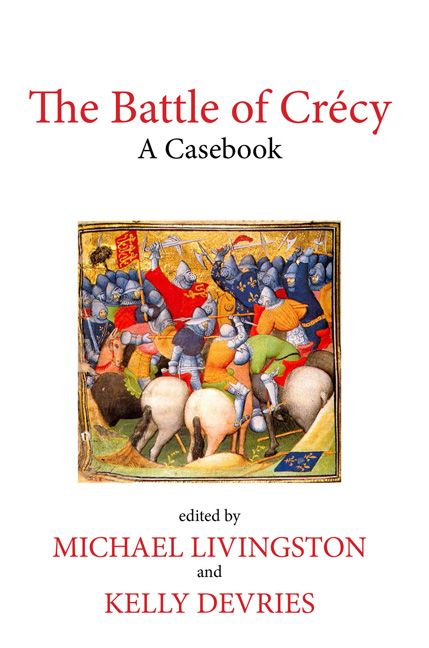Book contents
- Frontmatter
- Contents
- ILLUSTRATIONS
- CONTRIBUTORS
- PREFACE: THE SHAPE OF THE VOLUME
- MAP OF THE CRÉCY CAMPAIGN
- LOSSES UNCOUNTABLE: THE CONTEXT OF CRÉCY
- SOURCES ON THE BATTLE
- NOTES TO THE TEXTS
- ESSAYS ON THE BATTLE
- THE LOCATION OF THE BATTLE OF CRÉCY
- THE BOHEMIAN PARTICIPATION IN CRÉCY
- THE GENOESE CROSSBOWMEN AT CRÉCY
- THE TACTICS OF CRÉCY
- FROISSART'S HERCE AND CRÉCY
- THE ITALIAN PERSPECTIVE ON CRÉCY
- COUNTING THE DEAD AT CRÉCY
- THE AFTER-LIFE OF CRÉCY
- BIBLIOGRAPHY
- INDEX TO THE VOLUME
COUNTING THE DEAD AT CRÉCY
- Frontmatter
- Contents
- ILLUSTRATIONS
- CONTRIBUTORS
- PREFACE: THE SHAPE OF THE VOLUME
- MAP OF THE CRÉCY CAMPAIGN
- LOSSES UNCOUNTABLE: THE CONTEXT OF CRÉCY
- SOURCES ON THE BATTLE
- NOTES TO THE TEXTS
- ESSAYS ON THE BATTLE
- THE LOCATION OF THE BATTLE OF CRÉCY
- THE BOHEMIAN PARTICIPATION IN CRÉCY
- THE GENOESE CROSSBOWMEN AT CRÉCY
- THE TACTICS OF CRÉCY
- FROISSART'S HERCE AND CRÉCY
- THE ITALIAN PERSPECTIVE ON CRÉCY
- COUNTING THE DEAD AT CRÉCY
- THE AFTER-LIFE OF CRÉCY
- BIBLIOGRAPHY
- INDEX TO THE VOLUME
Summary
Like a great drama, the Battle of Crécy had an extraordinary cast of characters, and it was this assemblage of persons — in particular, the losses among the cast — that dominated the headlines after the event: of the 81 sources gathered here, only 11 do not contain mention of someone prominent who died there. In fact, the vast majority of our fourteenth-century sources incorporate what typically amounts to a catalog of the dead, a listing of names that almost invariably forms a separate, distinctly delineated section of the narrative, usually at the conclusion of the account of the battle. Interestingly, this was true even from some of the earliest remembrances. In his letter to Thomas Lucy written on 3 September, for instance, Edward III reports essentially nothing about the tactics of the battle, or hardly anything specific about the location, the difficulty, or the course of the battle. Yet reporting the results is clearly worth his time:
There were killed the king of Bohemia, the king of Majorca, the duke of Lorraine, the archbishop of [Sens], the bishop of Noyon, the Grand Prior of the Order of the Hospital of France, the abbot of Corbeil, the count of Alençon, the count of Flanders, the count of Blois, the count of Harcourt and his son, the count of Salm, the count of Auxerre, the count of Montbéliard, the count of Grandpré, the viscount of Melun, the viscount of Coucy, the lord of Rosenberg, the lord of Moreuil, the lord of Cayeu, the lord of Saint-Venant, and many other counts and barons and other great lords, men whose names are not yet known. In a small area where the first onslaught occurred more than 1,500 knights and squires died, even aside from the others who died afterwards on all parts of the battlefield. (Item 5.77–87)
Similar, though not usually identical, catalogs occur throughout our sources. In some cases, a catalog of the fallen is all that is preserved: Crécy was defined by its dead.
Only, as it happens, not all these men had died. True, the king of Bohemia was dead, but the king of Majorca would not pass away until 1349.
- Type
- Chapter
- Information
- The Battle of CrécyA Casebook, pp. 485 - 488Publisher: Liverpool University PressPrint publication year: 2015



